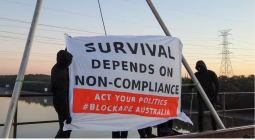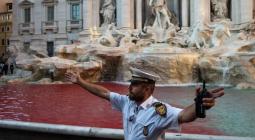No glue, chains or locks: Victoria’s antisemitism crackdown a smokescreen to target climate protesters, critics say
Police powers that request protesters remove their face masks in prescribed areas already exist, according to lawyer at Human Rights Law Centre
The Victorian government has been accused of “shoehorning” new anti-protest measures that could be used to crack down on the climate movement into reforms touted as necessary to combat antisemitism.
On Tuesday, Jacinta Allan announced a suite of legislative proposals to crack down on what the premier said was antisemitism and extremism at protests. The proposals were announced in the wake of an arson attack on a Melbourne synagogue.
The proposals include banning protests outside of places of worship, banning flying flags of groups the Australian government has listed as terrorist organisations, wearing face masks and balaclavas at protests, and the use of lock-on devices.
David Mejia-Canales, a lawyer at the Human Rights Law Centre, said that “there are already laws in place to prevent a number of these things” and that the proposal would give police wide-ranging discretionary powers that could be used against other protest movements.
“Police powers already existed to request protesters remove face masks in prescribed areas, and police already have move-on direction power for disturbance of the peace and not following that is a penalty,” he said.
The Victorian government flagged in its announcement that commonwealth law already banned the display of terrorist symbols, but the proposal would give police “stop, search and seize” powers.
Mejia-Canales was particularly concerned by the government’s proposal to ban lock-on devices, which he said would likely be used against the climate movement “given there really isn’t some sort of crisis of people locking themselves on to churches”.
Lock-on devices include glue, chains or locks which are used by protesters to attach themselves on to mining and logging equipment and disrupt operations.
“It just seems to me that this measure was sort of shoehorned into a media release to make it appear that the government is doing more than it actually is doing,” he said.
Mejia-Canales said Victoria was usually “careful and considered” when it came to such laws but the proposed changes appeared to be “kneejerk lawmaking” that was reflective of New South Wales’ approach to protests.
“The premier has been under fire, and indeed by her own police service, for failing to ‘not do more on protests’,” he said.
“We’re not going to fix racism, antisemitism and Islamophobia by criminalising protests.”
Allan said on Tuesday that authorities had “had enough of the protests that have caused division and disruption in our streets”, while insisting that the right to peaceful protest must be protected.
“It would be wrong for me to say that everyone who’s attending these protests is antisemitic,” the premier said.
Luke Hilakari, the secretary for Victorian Trades Hall Council, the peak body for the state’s unions, questioned the government’s move to ban protests outside of places of worship.
“Places of worship are also places of power and places of abuse,” Hilakari told Guardian Australia, pointing to historic child sex abuse cases in the church.
He pointed to the arson attack on Adass Israel synagogue in Ripponlea being declared a terrorist attack, saying in light of that he would have liked the government to do more on the drivers that are attracting people to the far right.
Hilakari said he was not against the government’s move to outlaw face masks. However, Jeremy King, a police misconduct lawyer in Victoria, said it gave police broad powers.
When announcing the proposal, Allan said face masks and balaclavas were “being used to conceal identities and shield agitators from crowd-control measures like capsicum spray”.
King said: “What might be laws that may be well-intentioned to stop people covering their faces whilst they do Nazi salutes, which should absolutely be outlawed, might be used against innocent people who are simply trying to protect themselves against heavy handed policing of protests.
“[Police] use OC spray, they use CS gas, they use rubber bullets, they use horses, they use all sorts of pretty extreme tactics,” King added.
“There are people who attend protests to exercise their democratic right who may want to use a face covering to protect themselves from OC spray that is indiscriminately sprayed into the crowd and they might be caught by these laws.”
Cover photo: A police officer uses capsicum spray in Melbourne. A lawyer says people using face coverings to protect against the spray at protests could fall foul of planned new state laws to combat antisemitism. Photograph: Chris Hopkins/Getty Images





